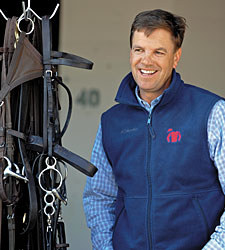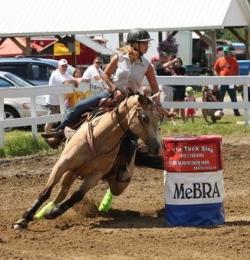 By Maddy Butcher
By Maddy Butcher
Graham Motion knows it.
Selby Barrett knows it, too.
A relaxed horse is a fast horse.
Motion is the thoroughbred trainer whose Animal Kingdom won the 2011 Kentucky Derby. The Wall Street Journal wrote about his unique training methods as they apply to horses and business management. Watch WSJ video.
Barrett is the young Mainer excelling at collegiate barrel racing at Murray State University. Read more about her.
Their training is geared around this tenant: Relaxed and happy horses do best.
Now university researchers at Michigan State have helped to quantify what these trainers knew empirically:
Nothing’s gained by forcing or intimidating your horse with whipping or kicking.
 In fact, there may be a lot to lose.
In fact, there may be a lot to lose.
The MSU team led by Karen Waite looked at “aggressive riding” among barrel racers and referenced previous findings which showed thoroughbreds raced faster when no whip is used.
Waite and company looked at more than 60 horse and rider pairs competing at state level barrel racing competitions. The pairs all raced in the same arena where the footing and race length were the same. Read more details here. Or read the abstract from Journal of Equine Veterinary Science here.
What is aggressive riding?
Researchers defined and quantified it by watching what riders were doing to the horses with their legs and hands and  distinguishing these actions with labels. They also developed a catalog for horse behaviors that included rearing, tail swishing, and kicking out.
distinguishing these actions with labels. They also developed a catalog for horse behaviors that included rearing, tail swishing, and kicking out.
Then they timed and videotaped the pairs.
Lo and behold: whipping and spurring did not make for faster runs.
It did, however, make for a less cooperative pairs. Horses with aggressive riders had more issues entering the arena and tended to buck and rear more often.
Great news from an exemplary study. Researchers get high marks for its simplicity and approach.
Said Motion, the thoroughbred trainer, “If horses are very nervous or wound up, they’re not going to race well because they’re running on nervous energy.”
His sentiment reflects what we know about a horse’s sympathetic (fight or flight) versus its parasympathetic (rest and digest) nervous system. Read more about that here.